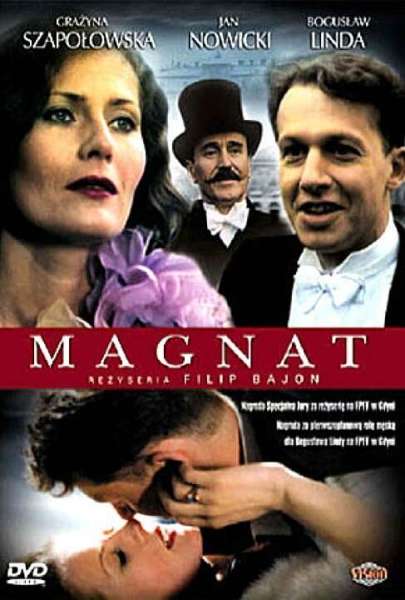The Magnate is a film of genre Drama directed by Filip Bajon with Jerzy Bińczycki
The Magnate (1987)

If you like this film, let us know!
Magnat is a 1987 Polish historical drama film directed by Filip Bajon.
The film traces the fascinating saga of a wealthy, princely Polish dynasty in years 1900-1935. In 1900 Prince Hans Heinrich XV von Teuss entertains Emperor Wilhelm II with a bison hunt at his palatial residence. He finds out many years later that his wife was emperor's secret mistress and divorces her soon after. In the '20s, during the Silesian uprisings against the German Empire, Prince's son Conrad turns out to be involved in a homosexual relationship and is unable to produce an heir to the family fortune. In 1932, the Prince, now married to young adventuress Marisca, becomes paralysed and confined to a wheelchair. His diabolical elder son takes over the ruined estate and unknown to his father becomes associated with Hitler's supporters and the Nazi party.
In 2004 Magnat was included in the list of 100 Best Polish Films of all time.
Synopsis
In the year 1900 the German Emperor, Wilhelm II, was invited for a bison hunt in the hunting lodge and estate of a wealthy industrialist and businessman Prince Hans Heinrich XV (of the von Teuss family) in German-controlled Silesia. The emperor, satisfied with the diplomatic services of the Prince for the country and charmed by his young wife Daisy, offers him a profitable position. The Prince is obliged to choose: either become the Great Huntsman of the Crown and receive additional land for building new factories, coal mines and manufacturing plants or become an Ambassador of the German Empire in London. Although under the constant pressure of his wife to choose the position of an ambassador, Hans Heinrich decides to choose the position of the Great Huntsman of the Empire. Later distressed Princess Daisy turns to the Emperor for help in order to escape from her tyrannical, cynical and obsessed husband. Upon the Kaiser's refusal she becomes involved in a scandalous affair that would later have devastating consequences on the von Teuss family and her marriage. The Prince eventually divorced Daisy in the 1920s.Actors

Jerzy Bińczycki

Bogusław Linda
(Bolko von Teuss)

Jan Nowicki
(Prince Hans Heinrich XV von Teuss)

Grażyna Szapołowska
(Marisca von Teuss)

Jan Englert
(Conrad von Teuss)

Olgierd Łukaszewicz
(Franzel von Teuss)
Comments
Leave comment :
Suggestions of similar film to The Magnate
There are 76 films with the same actors, 2 films with the same director, 62922 with the same cinematographic genres (including 4070 with exactly the same 2 genres than The Magnate), to have finally 70 suggestions of similar films.If you liked The Magnate, you will probably like those similar films :

Pan Tadeusz (1999)
, 2h27Directed by Andrzej Wajda
Genres Drama, War, Historical, Romance
Themes Histoire de France, Napoleonic Wars films
Actors Bogusław Linda, Alicja Bachleda-Curuś, Jerzy Bińczycki, Daniel Olbrychski, Grażyna Szapołowska, Andrzej Seweryn
Rating60%





Pan Tadeusz is told in flashbacks as the author, Adam Mickiewicz, reads his work to a group of elderly exiles in Paris. The story takes place over the course of five days in 1811 and one day in 1812 in rolling landscapes of Lithuania inhabited by Poles whose homeland has been recently partitioned among Russia, the Austrian Empire and Prussia. Not far off in history looms Napoleon's invasion of Russia, the prospect of which heartens Poles yearning for liberation. But more immediately, the characters in Pan Tadeusz are feuding among themselves.

War of Love (2010)
, 1h40Directed by Filip Bajon
Origin Pologne
Genres Drama, Comedy, Comedy-drama, Romance
Actors Anna Cieślak, Maciej Stuhr, Borys Szyc, Robert Więckiewicz, Andrzej Grabowski, Marta Żmuda Trzebiatowska
Rating38%






Wizja lokalna 1901 (1981)
, 1h26Directed by Filip Bajon
Origin Pologne
Genres Historical
Actors Jerzy Stuhr, Tadeusz Łomnicki, Daniel Olbrychski, Henryk Bista, Stanisław Michalski, Wirgiliusz Gryń
Rating63%






Flowers of Reverie (1985)
, 1h42Directed by László Lugossy
Origin Hongrie
Genres Drama, Historical
Actors Bogusław Linda, Grażyna Szapołowska, György Cserhalmi, Lajos Őze
Rating67%






The Taste of the Black Earth (1970)
, 1h39Directed by Kazimierz Kutz
Genres Drama, War
Actors Olgierd Łukaszewicz, Jan Englert, Jerzy Bińczycki, Daniel Olbrychski, Marian Dziędziel, Jerzy Trela
Rating69%





There are seven Basista brothers. Their father summons them all and tells them all to enlist and fight for Poland, threatening to kill any that betray the cause. They all swear to fight for Poland and free Silesia from the Germans. All civilians are warned beforehand to go for safety, and then they begin the uprising, attacking the town hall. One of the brothers, Cyryl, is killed. Eventually the German soldiers surrender, and the town is taken by the rebels. The populace come out and parade in the town square celebrating liberation.

Nights and Days (1975)
, 10h32Directed by Jerzy Antczak
Origin Pologne
Genres Drama, War
Actors Jadwiga Barańska, Jerzy Bińczycki, Beata Tyszkiewicz, Tadeusz Fijewski, Ewa Dałkowska, Andrzej Seweryn
Rating73%





Nights and Days is a family saga of Barbara Ostrzeńska-Niechcic, (played by Jadwiga Barańska) and Bogumił Niechcic, (played by Jerzy Bińczycki) against the backdrop of the January Uprising of 1863 and World War I. The film is a rather straightforward and faithful adaptation of a novel by Maria Dąbrowska with the same title. The plot is woven around the changing fortunes of a noble (upper-class) Niechcic family in the pre-WWI Poland. There are two main crossing threads: a social history one and an existential one. The cinematographic version is a condensation of the 12 part award winning TV serial of the same title and using the same cast and producers.

Man of Iron (1981)
, 2h20Directed by Andrzej Wajda
Origin Pologne
Genres Drama, Historical
Themes Films about the labor movement, Political films
Actors Jerzy Radziwiłowicz, Krystyna Janda, Bogusław Linda, Artur Barciś, Marian Opania, Andrzej Seweryn
Rating72%





The film is set in Gdansk in 1980. In Gdansk shipyard workers strike continues. Among them, an important role is played by activist Strike Committee, Maciek Tomczyk (played by Jerzy Radziwiłowicz). Radio journalist, editor Winkel (Marian Opania) is ordered by the deputy chairman of Radio Committee (Janusz Gajos) to achieve coverage compromising Tomczyk. Is sent to Gdansk, where a representative of the authorities Badecki (Franciszek Trzeciak) realizes the importance of his job.

Battle of Westerplatte (2013)
Origin Pologne
Genres Drama, War, Historical
Themes Political films
Actors Andrzej Grabowski, Michał Żebrowski, Jan Englert, Piotr Adamczyk, Borys Szyc, Mirosław Baka
Rating50%





This script must be run from the command line

Na odsiecz Wiedniowi (1983)
Genres Drama, War, Historical
Actors Jerzy Bińczycki, Emil Karewicz, Gustaw Lutkiewicz, Franciszek Pieczka, Jerzy Trela, Janusz Zakrzeński
Rating60%






Another Way (1982)
, 1h42Directed by Károly Makk
Origin Hongrie
Genres Drama, Historical
Themes Films about sexuality, LGBT-related films, LGBT-related films, LGBT-related film, Lesbian-related films
Actors Jadwiga Jankowska-Cieslak, Ildikó Bánsági, Grażyna Szapołowska, Judit Hernádi, Judit Pogány, Péter Andorai
Rating70%





At Christmas 1958 in Hungary, the body of Éva Szalánczky, an apparent murder victim, is recovered from a forest. In hospital, Livia Horváth, bandaged around her neck is recuperating, and is told that she will be unable to live her life as before; the reason is not made explicit.
 Connection
Connection